- Home
- Peter Cawdron
Reentry Page 3
Reentry Read online
Page 3
Even on Earth, we’re just one of an astonishing array of intelligent animals, from corvids to cephalopods—crows to cuttlefish. They may not construct rockets, but their ability to think and converse with each other is beyond doubt. Given time, why should a computer be any different? Wetware or dry, it’s all just the stage on which life unfolds.
Staring at the cargo boxes packed in around us within the Orion, the last thing that comes to mind is that they also contain a mass murderer. We trust computers. We rely on them for everything, especially in space—or rather we did.
Wen suspects there are several personalities on the forty-seven drives Su-shun salvaged, but I’ve only ever spoken to Jianyu. He seems real. He—
“Farewell.”
“Huh?” I blurt, seeing Wen staring out the window at the Herschel, our faithful steed over the past six months. Saying good-bye to a tin can makes no sense, but it’s human. Perhaps that’s it. We make no sense. Me hoping—wishing—Jianyu was still alive. Wen feeling some sentimental attachment to a spacecraft. Su-shun curious about something that tried to kill him. We’re creatures driven by emotion.
“Farewell,” I say, both acknowledging and agreeing with her, and resigning myself to our return flight. I need to clear my head. Think straight. Get my mind off this madness.
Spaceflight is counterintuitive. It’s fair to say we spend 99 percent of our time just drifting around. In the movies, astronauts whizz by in fancy rockets with engines blazing and flames spitting into the darkness. Reality is much less entertaining. Sitting here in the Orion, it’s easy to feel as though we’re waiting to get going, but we’re already racing around the planet at tens of thousands of kilometers an hour. We’re waiting for our closest approach to Earth before firing our engines to shift from an egg-shaped orbit into more of a circle. Then we’ll wait again, picking the right moment to swing into a lower orbit before one final burn has us reenter Earth’s atmosphere.
Spaceflight is about short bursts and long cruises. Our flight instructor likened it to gliding. She told us to imagine we could glide anywhere in the world. Take off from L.A. and glide to San Francisco, New York, London, Tokyo, or Antarctica—doesn’t matter. Fire your engines once or twice and then coast the rest of the way. It’s crazy, but that’s spaceflight.
Su-shun switches off the external comms and we can talk between ourselves in a more relaxed manner, without feeling as though someone’s listening over our shoulders. Our rigid suits prevent us from facing each other, so we sit in a line, facing forward with our visors open.
Talking. There’s been a lot of talking already without actually saying much. In the past, Wen and I have talked about everything other than what actually happened on Mars. Even Su-shun has been distant. I guess it’s hard for them. Jianyu was their friend. While I was an intruder into that sacred space.
The light coming in through the windows fades. We’re passing through the terminator, sailing from day into night as we orbit Earth.
Wen pats my forearm with her gloved hand. “How are you holding up?”
“Good.” In my experience, one-word answers are almost certainly a lie. At best, they’re an oversimplification. Perhaps for me, good is a bit of both.
“Do you want to talk?”
“No,” I say, almost laughing. “But I will.”
“Good,” she says, and I wonder if she sees the irony in how her response echoes mine. “Tell me what you’re thinking about on our last day in space.”
“I . . . I guess I went to Mars looking for life. We all did. We never expected to find anything that was actually alive, but we hoped for evidence of ancient life hidden in the rocks. I certainly never expected to find life in silicon wafers originally manufactured on Earth.”
Wen and Su-shun are quiet.
“Like you, I’m a scientist. I’m trained to be skeptical, to apply rigorous discipline before drawing any conclusions. If it looks too good to be true, it probably is. Back up your arguments with details. Avoid emotion. Beware of cognitive biases. I know the drill. And then I talk to Jianyu and all that goes out the window.”
“Is it really him?” Su-shun is skeptical, but he’s examined the code-base. He’s looked at the data stream and run analytics on the feed.
If there’s anyone in a position to make an objective judgment about what’s happening on those hard drives, it’s Su-shun, but he’s asking me. My viewpoint, though, is entirely subjective and dripping with personal bias.
“Yes,” I say.
Wen is pragmatic. “How can you be sure?”
“I can’t.” I pause, thinking about my response. “But the same is true for you. All of this—every thread within reality—could be fabricated, nothing more than a simulation in some crazy matrix. I have no proof it isn’t. Neither do you, but we trust that life is real. You’re as real as me, right? Is that any different from trusting that Jianyu’s real?”
“It is different.”
Grandmothers like Wen don’t get to walk on another planet without convincing a helluva lot of people they’re more capable than ten thousand other astronaut candidates. Wen’s experienced life in rural China. She’s seen hostile takeovers in corporate Shanghai, fierce debates in the Chinese Academy of Sciences, and worked on the astronaut selection board in Jiuquan. She wrote the manual on the long-term viability of space colonization and the dynamics of multicultural crews.
“What defines us?” I ask. “What makes us who we are? Our bodies, our experiences, what we’ve learned? Who we’ve met, decisions we’ve made? Are we just the sum of all these parts? Or are we something more?”
Wen ignores my questions. “What happened down there?”
Wen’s seen my report and watched the debrief video I did for Earth. It’s all in the electronic record, but I guess there’s nothing like hearing it fresh.
My mind casts back to those turbulent days on Mars. I’d been out on the surface, driving a rover across the rocky terrain. My oxygen supply failed, and my nav unit died. In retrospect, the false readings I had when leaving the base were the first clue about what we were dealing with.
I traversed a dozen craters trying to find my way home and ended up on a cliff overlooking the hub. From there, I jumped. Somehow, I survived the landslide, and James—our robotics engineer from Canada—dragged me back to base.
What happened down there?
Jianyu died while tending to me in the depths of the hub. He was dead long before the A.I. removed his skullcap and inserted electrodes into his brain. I still don’t understand how it was possible to resurrect—or copy—his consciousness. Cellular death occurs at different rates for different organs, long after the last breath is taken, but reviving an entire body is limited to about three minutes after death. Could it be that the structure of the brain remains intact far longer?
What did happen? How did the atmospheric scrubbers fail without anyone noticing? We were under attack by the same artificial intelligence that had decimated Earth, only we didn’t know it at the time. Nuclear bombs fell on Earth as countries attacked each other, mistaking neighbors for the real enemy. Humanity was so used to killing itself, it barely noticed the electronic provocation.
Meanwhile, cyberwarfare was waged on Mars. We should have recognized the signs: fake imagery planted to mislead us. Computer equipment failing when no critical, highly redundant system had failed in more than seventy years of space travel.
Our own robotic serfs turning against us, setting out to murder us.
“Jianyu was dead when I woke in Medical. His body was cold.” I choke up. I have to fight to speak. “I was—I was distraught. I called Anna.”
“Why Anna?”
“I—I don’t know. I just did.” I haven’t thought about it before now, but I understand the point of Wen’s question. Why did I call someone from the Russian module and not the U.S.? Or the Chinese? Anna’s a doctor, but more than that, she’s a friend. Ultimately, I think I just went to someone I could trust. Someone I thought could help.
Out of the hundred and twenty colonists on Mars, only fifty-eight survived, spread across five backup sites. These days, with power rationing in effect, the internal temperature is two degrees Celsius, which is like living in a fridge for us, but it’s a tropical paradise as far as Mars is concerned. With the right clothing, it’s bearable—just. I can’t help but think of Anna and the others still on the planet, subsisting as they try to salvage what’s left of the mission.
As an afterthought, I add, “Connor and Harrison were the first ones down there.”
“What does that tell you?”
Wen should be a psychiatrist.
“They care. I guess we’re family. Shit happens, but in a crunch, we’re there for each other.” I’m speaking about them in the present tense, but I’m very much aware there’s no present for them. Tears well up in my eyes, refusing to roll down my cheeks in weightlessness. I shudder at the thought of how my friends died, wiping my eyes with my bulky, gloved fingers.
“And Jianyu.”
“I don’t know what happened to his body.” By the time they found me, all that remained was a shell. “Connor carried me back to the U.S. mod. The next time I saw Jianyu, he was lying in a body bag with his skullcap removed, cut cleanly just above his eyebrows. And the wires. I remember wires. There were hundreds of needles and wires branching over his exposed brain. They formed a mesh. Each point held a thin probe reaching deep into . . .”
I can’t go on.
Wen squeezes my hand as best as she can through the suit.
“And then he spoke to me. Not from there next to me. From out in the hallway. And later through the speakers in my helmet.”
“What did he say?”
“I . . . I don’t know. I mean, I remember, but I remember what I think I heard. I—I can’t be sure exactly what he said. He sounded disoriented. Quiet. I don’t think he could believe what had happened.”
Su-shun asks, “And you think it’s him, it’s really Jianyu.”
“Yes.”
“Why?” Wen should be alawyer.I’m about to answer when she clarifies, “Why would it do that? Why would an artificial intelligence even try to upload a human consciousness?”
“I don’t know.”
“The A.I. killed millions on Earth. Why would it save one person on Mars? Doesn’t that strike you as out of character?”
“Yes.”
“Does it bother you?”
“Yes.”
“And yet still you believe.”
“Yes,” I say a third time.
“Why would it do that?”
“I don’t know. I’d be guessing.”
“Then guess,” Su-shun says.
“I don’t think it was a ploy to fool me. Whatever the A.I. did, it did it long before I entered the base to destroy it. The effort required would have exhausted its resources, delaying its departure. To upload Jai’s consciousness, it had to divert a robot, retrieve a heavy-duty fiber optics cable and wire it up with copper probes along with god knows what else. Then it had to remove his skull, plant the probes, and try to access a dead brain.”
Wen says, “Perhaps it was looking for the code to the data center.”
“No.” I’m relishing the opportunity to talk so openly with Wen and Su-shun. They’re making me think, challenging me to confront my assumptions. “There’s no reason to think Jai ever knew the code. If anything, there was every reason to think he didn’t. There’s only ever been a handful of us that needed access to those consoles.”
“Then why?”
“Maybe we’re asking the wrong question,” I say. “We’re assuming there’s a simple answer. Maybe there isn’t. If life is anything, it’s unpredictable, driven by emotion, desires, instincts—not logic.”
Su-shun asks, “So, you don’t think it’s logical?”
“Not in the strict sense of binary values—ones and zeroes. Not any more than we are. Logic is just one factor in any decision. We’re driven by competing desires—pleasure, duty, ethics, aesthetics.”
“Hey, speaking of aesthetics.” Su-shun points at his window. “Bringing us around.”
He works with his controls, using the maneuvering jets to change our attitude. Tiny thrusters roll the craft around without having any effect on our trajectory. A blue haze drifts across his face, slowly flooding the craft. Our spaceship skews sideways slightly, and the view straightens.
Su-shun’s helmet blocks my line of sight. “Look at that! Beautiful.”
Wen and I crane our necks, trying to see beyond the smooth white curve of his helmet and out of what’s effectively a porthole. Clouds dot the sea like discarded cotton balls. They cast shadows on the azure water, giving us a sense of height and scale. Golden sands mark beaches running alongside a dark green jungle. I’m trying to recognize the islands, but I can’t. We could be anywhere over the Caribbean, Indonesia, or somewhere like Madagascar. Wherever those islands are, they’re majestic.
Earth is nothing like Mars.
Su-shun rolls the craft, spinning us over, and suddenly the view is outside my window. He’s taking liberties with our fuel. No doubt someone in Mission Control is watching and smiling. Nothing’s said. They know. Just a bunch of astronauts returning from a dusty, lifeless, rust-colored bowling ball, doing a little sightseeing.
“Stunning.”
“It is,” Wen says.
We’re united in our admiration of the planet below. For all our desire to conquer space and colonize Mars, there’s nothing like coming home.
A timer on the main screen indicates five minutes before our first burn. Su-shun switches to automatic control and the craft aligns itself. A little more patience, then the smooth rumble of thrusters firing pushes softly against my back.
Houston comes back on the com. “You are looking good, MR-131. We calculate your reentry over the Pacific in three hours and fifteen minutes.”
Su-shun replies, “Roger that.”
We pass through another two orbits, with another burn, but our conversation never returns to Mars or Jianyu. I can feel the tension in the air. Wen and Su-shun are conflicted by what they’ve been tasked to do, returning the A.I. to Earth to stand trial.
Finally, we undergo a deorbit burn and begin falling deep into Earth’s gravity well. There’s only ever going to be one outcome now. With our backs to Earth, we plummet through the atmosphere.
Gravity builds. The Orion shakes.
Reentry is governed by simple physics. The weighting of the craft ensures it faces away from our direction of motion, with its heat shield leading the way. Like a bullet being shot into water, our motion is dropping ever more sharply the deeper we fall.
“We’re entering blackout.”
We’re now cut off from Mission Control.
Plasma builds up outside, the result of friction as we thunder into the frigid, tenuously thin air well over a hundred kilometers above the surface of the planet, still traveling at over seventeen thousand kilometers per hour. Flames lick at the windows, curling past our craft.
We’re passing through hell.
One tiny flaw, a slight gap in the ceramics or chips of shielding breaking away under stress, and the superheated plasma will cut through our spacecraft like a welding torch. Once inside, temperatures in excess of four thousand degrees would vaporize us and turn the craft into a blob of molten metal before we even knew what was happening.
The shock wave building up in front of our craft reaches even higher temperatures, acting as a buffer, a bow wave insulating us from temperatures approaching those found on the surface of the sun. Our heat shield is slowly being stripped away. Tiny grains are ripped from the surface, peeling off and tearing past the craft like miniature comets.
It feels as though an elephant’s sitting on my chest. Breathing is difficult. Blood pools in my legs. I clench my muscles, trying to force blood back to my head. The craft shakes.
Six gees.
We’re a meteor now—diving through the atmosphere in a blaze of light and heat.
I’m dizzy. I’m not sure how many gees we end up pulling as my vision blurs, but it’s north of eight.
“Peak load.”
Su-shun is calm. I’m clenching my teeth. I’ve never been good at reentry. It’s too much like a controlled demolition for my liking. The idea of being shot out of a cannon has more appeal. Launches aren’t much better.
Orbits are good. I like orbits.
I grip the armrests for dear life, as though they’ll provide me with some control or comfort. They don’t.
Slowly, the darkness out the window softens, becoming a pale blue.
“And . . . we are subsonic.”
The shaking lessens.
“FBC away.”
Su-shun is methodical. He’s taking us through the playbook from memory. I’ve forgotten what FBC stands for, but I know it protects our parachutes during reentry. As a mission specialist, I was always more interested in getting between planets, trusting in our engineers and pilots, but now I find myself wishing I’d paid more attention.
“Drogue chutes away.”
The drag on the craft increases with the smaller chutes deployed. We’re still plunging into the atmosphere, but we’ve lost almost all of our phenomenal orbital speed.
“Fifteen thousand feet. Coming up on main chute deployment.”
He adds his own personal recommendation.
“Arms.”
We cross our arms over our chests, trying not to touch any part of the craft as the main chutes unravel. The Orion shudders, but not as violently as I expected. I feel the parachutes unfolding, being dragged off the side of the craft and pulled high overhead as they unfurl. The capsule rocks, settling beneath three enormous, candy-striped canopies.
“We have visual ” is the call over the radio. “Three nice, bright lollipops. You are looking good, MR-131.” Somewhere out there, a spotter plane is circling wide of the landing zone. Someone’s peering through binoculars, looking at our three parachutes and the tiny black smudge hanging over a hundred feet beneath them.

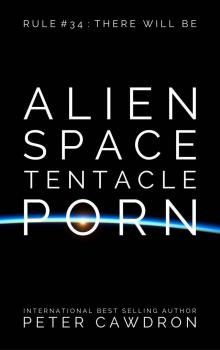 Alien Space Tentacle Porn
Alien Space Tentacle Porn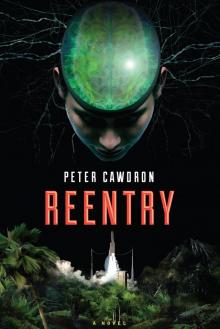 Reentry
Reentry Déjà Vu (First Contact)
Déjà Vu (First Contact) Wherever Seeds May Fall (First Contact)
Wherever Seeds May Fall (First Contact) But The Stars
But The Stars Trixie & Me
Trixie & Me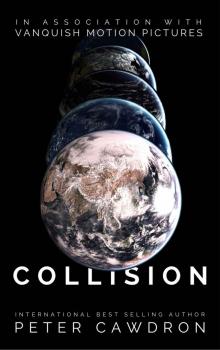 Collision
Collision Jury Duty (First Contact)
Jury Duty (First Contact)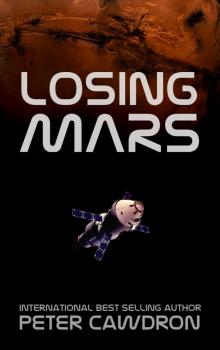 Losing Mars
Losing Mars We Are Legion (van Helsing Diaries Book 2)
We Are Legion (van Helsing Diaries Book 2) Van Helsing's Diaries (Books 1-3): Nosferatu
Van Helsing's Diaries (Books 1-3): Nosferatu Shadows
Shadows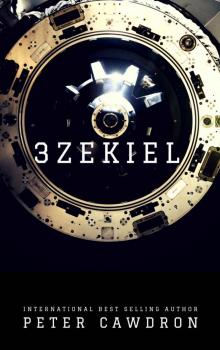 3zekiel (First Contact)
3zekiel (First Contact) Vampire (van Helsing Diaries Book 1)
Vampire (van Helsing Diaries Book 1) Xenophobia
Xenophobia All Our Tomorrows
All Our Tomorrows My Sweet Satan
My Sweet Satan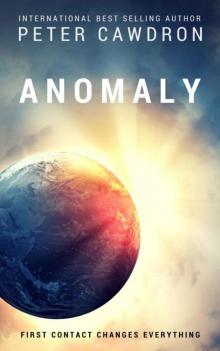 Anomaly
Anomaly Monsters
Monsters